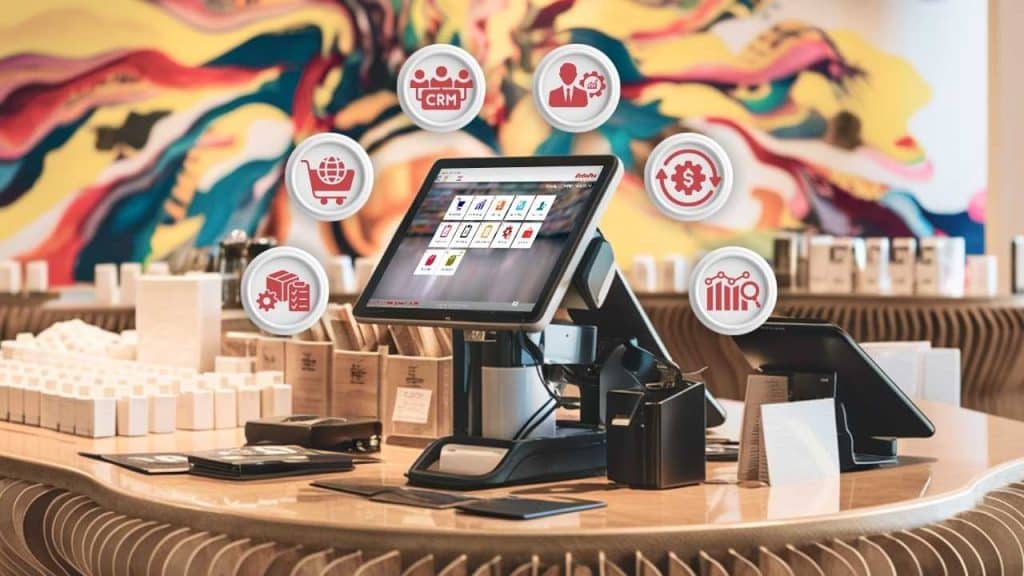Harnessing the full potential of your Point of Sale (POS) system through POS integration with other retail tools offers more than just operational convenience—it’s a transformative strategy that propels your retail business forward. This integration ensures that your POS system, particularly your retail POS, works in concert with inventory management, customer relationship management, and other critical systems, creating a cohesive and efficient retail ecosystem. Let’s explore how POS integration can streamline your operations, enhance your customer interactions, and ultimately boost your business’s efficiency.
Why Integrate Your POS System?

- Streamlined Operations
Integrating your retail POS system with other software solutions like inventory management systems or ERP software can automate data flows, reduce manual entry errors, and speed up transaction times. This streamlined approach ensures that information is updated in real-time across all platforms, enhancing operational efficiency.
- Enhanced Customer Experience
By connecting your retail POS system with CRM tools, you gain access to detailed customer data at the point of sale. This information can be used to personalize interactions, recommend products based on past purchases, and improve overall customer service. Such personal touches not only boost customer satisfaction but also encourage loyalty.
- Improved Decision Making
Integrated systems provide a comprehensive overview of your business metrics from sales data to customer preferences and inventory levels. This consolidated information is invaluable for making informed decisions that drive business growth.
What Can Be Integrated with Your POS System?
Integrating your retail POS system with other retail tools can significantly enhance your business’s capabilities. Here are some key POS integrations you should consider:
- Inventory Management Systems
Synchronize your POS with inventory software to keep stock levels updated in real time, reducing the risk of overstocking or stockouts.
Connect your retail POS to your online store to unify sales channels, making inventory and sales data consistent and accessible from anywhere.
Integrate CRM to track customer interactions and purchase history, allowing personalized marketing and loyalty programs.
- Employee Management Tools
Linking your POS with staff management systems helps in scheduling, payroll processing, and monitoring staff performance efficiently.
- Analytics and Reporting Tools
Advanced analytics tools can analyze sales data, customer trends, and operational efficiency to help make more data-driven decisions.
- Payment Processors and Banking Systems
Integrating with various payment systems ensures that transactions are secure, swift, and versatile, accommodating a wider range of payment methods.
How to Achieve Effective POS Integration

Tip 1: Choose Compatible Tools
When selecting retail management tools to integrate with your retail POS, compatibility should be a top priority. Look for tools that can seamlessly communicate with your POS system, ensuring data accuracy and reliability.
Tip 2: Leverage Expertise
Utilizing the knowledge of integration specialists or consulting with your POS provider can help you understand the best practices and common pitfalls of POS integration. Their expertise can guide you through a smooth integration process.
Tip 3: Prioritize Scalability
Consider how the integrated system will scale with your business. It’s crucial to implement solutions that can grow and adapt as your retail operations expand.
Deep Dive: Advanced Integration Strategies
To truly capitalize on the power of POS integration, consider implementing advanced strategies such as:
- Real-Time Data Synchronization
Utilize middleware solutions that enable real-time data exchange between your POS and other systems, ensuring immediate updates and data accuracy.
- AI and Machine Learning
Leverage AI-driven tools to predict customer behavior, manage inventory more effectively, and personalize marketing efforts based on data collected through your integrated systems.
- IoT Integrations
Integrate IoT devices such as RFID tags for inventory management and smart sensors for in-store analytics, enhancing the physical retail experience and operational efficiency.
Case Studies
Highlighting a few real-world examples, businesses that have successfully utilized POS integration have seen marked improvements in efficiency and customer satisfaction. For instance, a retail clothing store that integrated its retail POS with an inventory management system was able to reduce stock discrepancies by 30% and improve the speed of customer checkouts.
Conclusion

Embracing the integration of your retail POS system with essential retail management tools not only enhances operational efficiency but also sets your business apart in a competitive retail landscape. This strategic fusion of technology drives innovation, fosters customer loyalty, and accelerates growth. If you’re ready to transform your retail operations and create a more responsive, efficient, and interconnected business environment, now is the time to start.
Consider taking the next step by consulting with integration experts to tailor a solution that fits your specific needs. Contact us today to discover how our solutions can help you achieve seamless integration and sustainable growth.

